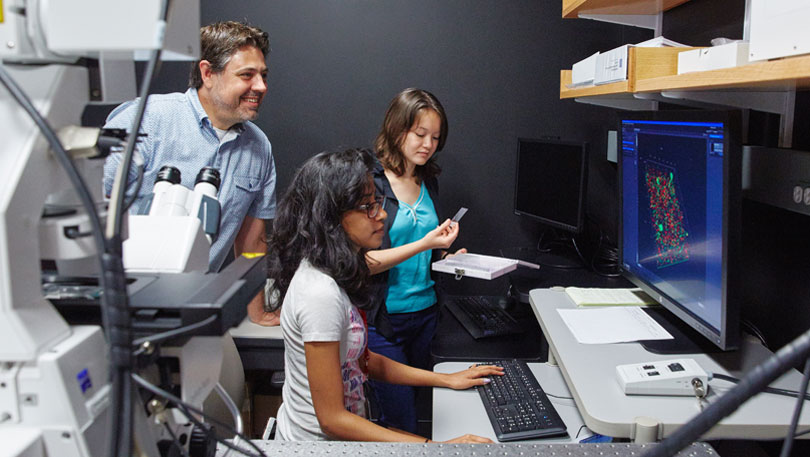Research Experiences

Students in the 2-year, research intensive MS track are eligible to complete their thesis research in several laboratories on campus and off. Below you will find our current opportunities for students to engage in this research.
Internal Research Laboratories
Human Systems Neuroscience Laboratory
Human Systems Neuroscience Laboratory
Director: Dr. Basilis (Vasileios) Zikopoulos
Research in the Human Systems Neuroscience Laboratory focuses on the study of the organization and dynamics of cortical brain circuits, and their disruption in disease. Increasingly, our work has been focusing on processes that shape network dynamics and the delicate balance of excitation and inhibition, which are consistently disrupted in autism and other neurodevelopmental disorders.
We use advanced experimental and computational approaches to image and study molecular, synaptic, cellular interactions and interareal network connectivity, as the basis of cognitive and emotional processing for flexible attention and goal-oriented behavior in humans, non-human primates and other relevant animal model systems. Our innovative multi-disciplinary approach includes correlated light, confocal and electron microscopy; and large-scale, and thus far unprecedented, three-dimensional analysis and reconstruction of labeled pathways and their synaptic and neurochemical interactions within functionally-distinct networks.
These cutting-edge, high-resolution experimental approaches, complemented by advanced computational and image analysis techniques, have made it possible to conduct detailed quantitative analyses and develop brain-based circuit and computational models, describing novel circuits that have a key role in cognitive and emotional processes. This experimental and theoretical framework that helps us derive principles from complex data on connections and their interactions provides a solid foundation to integrate bench and clinical research across neuroscience disciplines.
Q.U.E.E.R. Lab
Queer Understanding, Equity and Educational Research
Directors: Dr. Jesse Moreira-Bouchard, Dr. Lisa Roberts
Movement and Applied Imaging Lab
Website
The Lab is a trans-disciplinary collaboration with the objective of preventing and managing musculoskeletal disorders, primarily osteoarthritis. We use state-of-the-art technologies to study the quality and quantity of movement during daily activities, and its effects on the health of cartilage, muscle, bone, etc. This information helps us identify risk factors for hip and knee osteoarthritis. Specific populations that may be at-risk include athletes with femoroacetabular impingement at the hip, ACL tears, meniscus injuries, and older adults with obesity, and women. Our goal is to develop novel strategies to prevent and manage the disability associated with hip and knee osteoarthritis.
Neural Systems Laboratory
Neural Systems Laboratory
Director: Dr. Helen Barbas
The Neural Systems Lab specializes in the organization of the prefrontal cortex and its role in central executive functions in primates. Our research objective is to investigate prefrontal pathways that interface with both excitatory and inhibitory neurons in cortical and subcortical structures, possibly providing the basis for selecting relevant information and suppressing irrelevant information in primate behavior.
The use of neural tracers to label pathways, combined with a multi-modal approach, makes our work cutting-edge. We use histochemical, immunocytochemical, and molecular procedures; quantitative approaches and imaging; and multidimensional analyses.
The Heat Stress & Exercise Laboratory
Research in the Heat Stress & Exercise Lab (HS&E), directed by Dr. Dustin Allen, broadly focuses on how humans regulate their body temperature during exercise in the heat. Current projects focus on using virtual reality to determine whether the information that humans see visually impacts their thermoregulatory system and ability to control body temperature during exercise. Additionally, upcoming projects will focus on how exercise in the heat over a 5-hour period (i.e., a work shift) translates to biomarkers of kidney injury. You can find more information about this research and the research team by visiting the HS&E’s website.
External Clinical & Academic Laboratories
Beyond BU’s laboratory experiences, there are many opportunities at nearby clinics, hospitals, and research institutions. Below are some examples of research experiences that MS students can participate in:
Exercise Oncology Laboratory at the Dana-Farber Cancer Institute
Dieli-Conwright Laboratory at Dana-Farber Cancer Institute
Using an “Exercise Is Medicine” approach, the Dieli-Conwright Laboratory is centered on testing personalized exercise interventions to improve cancer outcomes among individuals across the lifespan diagnosed with cancer. Rooted in clinical exercise physiology, the lab examines mechanisms by which post-diagnosis exercise can impact cancer outcomes, with a specific focus on biomarkers related to body composition, inflammation, metabolic dysregulation, and cognition. Researchers derive randomized controlled trials to test whether various types of prescriptive exercise improve cancer outcomes in individuals from diverse racial and ethnic backgrounds diagnosed with cancer across the lifespan, from adolescents and young adults to older adults.
Brain Networks Laboratory
Brain Networks Laboratory
University Medical Center of Hamburg University
Our lab is focused on studying various aspects of brain connectivity. Specifically, we use statistics and neuroinformatics to establish the characteristic organization of brain networks and explore the implications of this organization for brain dynamics and function through computational modeling. We believe brain dynamics and function need to be understood in the context of the brain’s complex network organization.
We are using a very wide range of approaches, from neuroinformatics (done in close collaboration with experimental neuroanatomists, particularly the Barbas lab at BU Health Sciences) and computational modeling of brain dynamics to experimental studies of brain modulation by transcranial magnetic stimulation (TMS), in order to understand from several different perspectives ‘how the brain works.’
We have students with a wide range of backgrounds, from biology and psychology to physics and computer science—reflecting the diverse techniques and approaches that are employed in modern neuroscience. Most of our graduates stay in academia, and have established their own labs by now.
As part of our research, we also study the consequences of lesions in brain networks, using ‘virtual lesions’ (produced by TMS) as well as computational modeling.
Basic and Translational Cardiovascular Research Laboratory
Cardiovascular Institute, Beth Israel Deaconess Medical Center
The major focus of our laboratory is basic and translational cardiovascular research with an emphasis on developing novel therapies for cardiovascular diseases. One of our research interests is to study the molecular mechanisms of cardiac apoptosis (programmed cell death) and develop new anti-apoptotic applications in cardiovascular diseases. One of the ways in which heart muscle is injured following a loss of blood supply (as in a myocardial infarction, or heart attack) occurs when blood reenters, or reperfuses, the tissue. This results in a cascade of events, including the release of free radicals and the initiation of apoptosis. Hydrogen peroxide is the most abundant free radical produced during reperfusion injury.
Our work is highly innovative, in that we are using nanotechnology to design and engineer molecules that are selectively activated by the hydrogen peroxide released during reperfusion injury. The beauty of this system is that therapeutic substances engineered into the nanoparticles are released only at the site of the injury, rather than being distributed throughout the entire body. This same system could also be exploited to image the damaged tissue.
In a second project, we showed that Vitamin D therapy prevents the progression of cardiac hypertrophy and heart failure in animal models. We are currently investigating the molecular mechanism of cardiac dysfunction associated with Vitamin D deficiency and examining the potential role of Vitamin D therapy in the treatment of heart failure. Also, in collaboration with other investigators, we identified novel Vitamin D receptor agonists and are studying these novel compounds for clinical applications.
External Industry Laboratories
If you are interested in exploring a career in industry, we have several unique research opportunities that offer our MS student the opportunity to complete their thesis research in their laboratories:
New Balance Sports Research Lab

Students working in the New Balance Sports Research Lab will be an integral part of the Foundational Research team with the goal to push human performance with academic grade quality. They will conduct protocols within the disciplines of physiology, biomechanics, perception and materials science in both running and sport.
WHOOP Labs

Master’s students placed at WHOOP Labs will have the opportunity to participate in product innovation and product development research at a leading wearable tech company. Students will conduct research sessions contributing to data collection for early-stage exploration to final system validation, working as part of a diverse team and mentored by a senior researcher. They will also have the opportunity to take ownership of a project end-to-end, which will be structured to support future publication/portfolio inclusion.
Eight Sleep

Students engaging in research with Eight Sleep will collaborate on innovative projects at the intersection of physiology, technology, and sleep science. Areas of focus include evaluating biometric accuracy, exploring methods to detect and mitigate sleep disorders, and examining how temperature regulation affects sleep quality, particularly in women. This immersive research experience supports students in developing a thesis while contributing to broader efforts that advance human sleep and performance science.
SuppCo

Students working with SuppCo will lead an independent research project using the company’s proprietary dataset, identifying novel questions and contributing to publishable scholarship. Additional opportunities include synthesizing evidence on supplement efficacy, analyzing product-outcome relationships, and translating complex findings into accessible content for both scientific and general audiences. This experience supports the development of a research thesis while deepening expertise in nutritional science and data interpretation.